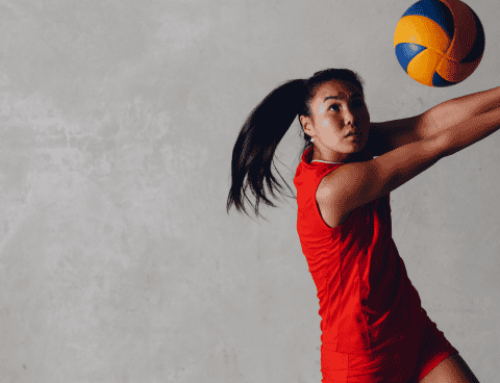Study Suggests Physical Activity Helps Athletes Perform Better on Mental Tests
If you’re an athlete, you warm up before practice or a game because it helps you perform at your peak. But what about when you’re preparing for strenuous mental activity—y’know, like homework? You probably go straight from Facebook to your physics worksheet without batting an eyelash.
It might be time to rethink that approach.
Research published in the December 2013 issue of Frontiers In Human Neuroscience suggests that, if you’re athlete, being active might help your brain perform better. Researchers observed that athletes who attempted to solve a creative problem while in the middle of physical activity (in this case, riding a bike) performed better than when they attempted to solve a similar problem after being at rest.
The Study
Researchers compared two groups: Those who exercised at least three times per week for the past two years (athletes) and those who did not exercise regularly (non-athletes).
Both groups completed two tests. The first test, called an “alternate uses task,” assessed the participants’ ability to think creatively by asking them to come up with as many uses as they could for a simple household item, like a pen, bottle or towel. The second examined their ability to find the common link between three unrelated words like “hair,” “stretch” and “time.” (The answer, BTW, is “long.”) That exam was called the “remote association task.”
The alternate uses task tested “divergent thinking,” the ability to come up with creative solutions to a certain problem. The remote association task tested “convergent thinking,” the ability to come up with a single, correct solution to a given problem.
The Results
Researchers found that athletes tended to perform better on the convergent thinking task during or after moderate or intense exercise than when they attempted those tests after being at rest. In fact, athletes performed worse than non-athletes on the remote association task when both groups attempted it after rest.
“From the current results,” the study’s authors wrote, “one may even speculate that for people who are used to exercise, the absence of exercise impairs (creative) performance.”
The best part? The improvement athletes experienced after being active lasted for a significant amount of time, according to researchers. “The benefit for athletes [extends] up to 30 minutes after exercise,” said Lorenza Colzato, one of the researchers.
The opposite was true for non-athletes, who tended to perform worse at convergent thinking during or after exercise than they did while at rest. Researchers surmise that non-athletes performed poorly because the extra exertion required for exercise might tire out their brains.
In short: If you’re fit, you may benefit from being active before taking on a mental task. If you’re not, you definitely won’t. “Creative performance may be best whenever one carries out one’s preferred activity,” Colzato said. “Athletes during exercise and non-athletes during rest.”
The researchers cautioned that although their findings were not overwhelming, their data suggested that even a moderate amount of physical activity undertaken on a regular basis can improve one’s problem solving ability. “Our observations suggest that more exercise may enhance convergent thinking, at least in individuals with a higher degree of physical fitness,” they wrote.
How You Can Use This
The next time you’re about to take a test or dive into your homework, prepare like you would for a big game—with a physical warm-up. A little exercise will get your blood pumping, make you feel more alert, and—according to this research—sharpen your creative problem solving.
By warming up your body, you might just be warming up your brain, too.
RECOMMENDED FOR YOU
MOST POPULAR
Study Suggests Physical Activity Helps Athletes Perform Better on Mental Tests
If you’re an athlete, you warm up before practice or a game because it helps you perform at your peak. But what about when you’re preparing for strenuous mental activity—y’know, like homework? You probably go straight from Facebook to your physics worksheet without batting an eyelash.
It might be time to rethink that approach.
Research published in the December 2013 issue of Frontiers In Human Neuroscience suggests that, if you’re athlete, being active might help your brain perform better. Researchers observed that athletes who attempted to solve a creative problem while in the middle of physical activity (in this case, riding a bike) performed better than when they attempted to solve a similar problem after being at rest.
The Study
Researchers compared two groups: Those who exercised at least three times per week for the past two years (athletes) and those who did not exercise regularly (non-athletes).
Both groups completed two tests. The first test, called an “alternate uses task,” assessed the participants’ ability to think creatively by asking them to come up with as many uses as they could for a simple household item, like a pen, bottle or towel. The second examined their ability to find the common link between three unrelated words like “hair,” “stretch” and “time.” (The answer, BTW, is “long.”) That exam was called the “remote association task.”
The alternate uses task tested “divergent thinking,” the ability to come up with creative solutions to a certain problem. The remote association task tested “convergent thinking,” the ability to come up with a single, correct solution to a given problem.
The Results
Researchers found that athletes tended to perform better on the convergent thinking task during or after moderate or intense exercise than when they attempted those tests after being at rest. In fact, athletes performed worse than non-athletes on the remote association task when both groups attempted it after rest.
“From the current results,” the study’s authors wrote, “one may even speculate that for people who are used to exercise, the absence of exercise impairs (creative) performance.”
The best part? The improvement athletes experienced after being active lasted for a significant amount of time, according to researchers. “The benefit for athletes [extends] up to 30 minutes after exercise,” said Lorenza Colzato, one of the researchers.
The opposite was true for non-athletes, who tended to perform worse at convergent thinking during or after exercise than they did while at rest. Researchers surmise that non-athletes performed poorly because the extra exertion required for exercise might tire out their brains.
In short: If you’re fit, you may benefit from being active before taking on a mental task. If you’re not, you definitely won’t. “Creative performance may be best whenever one carries out one’s preferred activity,” Colzato said. “Athletes during exercise and non-athletes during rest.”
The researchers cautioned that although their findings were not overwhelming, their data suggested that even a moderate amount of physical activity undertaken on a regular basis can improve one’s problem solving ability. “Our observations suggest that more exercise may enhance convergent thinking, at least in individuals with a higher degree of physical fitness,” they wrote.
How You Can Use This
The next time you’re about to take a test or dive into your homework, prepare like you would for a big game—with a physical warm-up. A little exercise will get your blood pumping, make you feel more alert, and—according to this research—sharpen your creative problem solving.
By warming up your body, you might just be warming up your brain, too.













